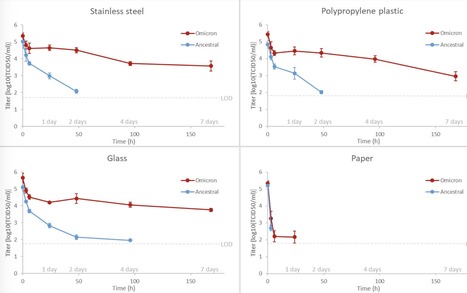The Omicron BA.1 SARS-CoV-2 variant of concern spreads quickly around the world and outcompetes other circulating strains. We examined the stability of this SARS-CoV-2 variant on various surfaces and revealed that the Omicron variant is more stable than its ancestral strain on smooth and porous surfaces. The newly emerged Omicron SARS-CoV-2 variant of concern (VOC) is highly transmissible in humans. It outcompetes other previously known variants and dominates in different geographical locations in recent months (1). Its spike protein has more than 30 mutations compared to the ancestral strain (2). A recent structural study indicates its spike protein is more stable than the ancestral strain (3). This prompts us to hypothesize that Omicron VOC is also more stable on different surfaces. We previously showed that the ancestral SARS-CoV-2 can still be infectious for several days and hours at room temperature on smooth and porous surfaces, respectively (4). Here, we report that Omicron VOC is more stable than the ancestral strain on these surfaces.
Previously described ancestral SARS-CoV-2 (PANGO lineage A) and Omicron VOC (PANGO lineage BA.1) were used in this study (5, 6). Their stability on different surfaces were tested using our previously described protocol by us (4, 7). In brief, a 5 μl droplet of each virus (10^7 TCID50/ml) was applied on different surfaces with a dimension of 1×1 cm2. The treated surfaces were incubated at room temperature (21-22°C) for different time points as indicated and were then immersed in viral transport medium for 30 min to recover residual infectious virus. The recovered virus was titrated by TCID50 assays using Vero-E6 as described (4, 7).
When compared to the ancestral SARS-CoV-2, the Omicron BA.1 variant was shown to be more stable on all studied surfaces (Table). At 2 days post-incubation, the infectious viral titres of ancestral SARS-CoV-2 recovered from stainless steel, polypropylene sheet and glass reduced by 99.91%, >99.86% and 99.9%, respectively. No infectious ancestral SARS-CoV-2, except in one out of three treated glass samples, could be recovered on day 4 post-incubation. In contrast, the Omicron variant could still be recovered from these treated surfaces on day 7 post-incubation....
Preprint available in bioRxiv (March 10, 2022):



 Your new post is loading...
Your new post is loading...







